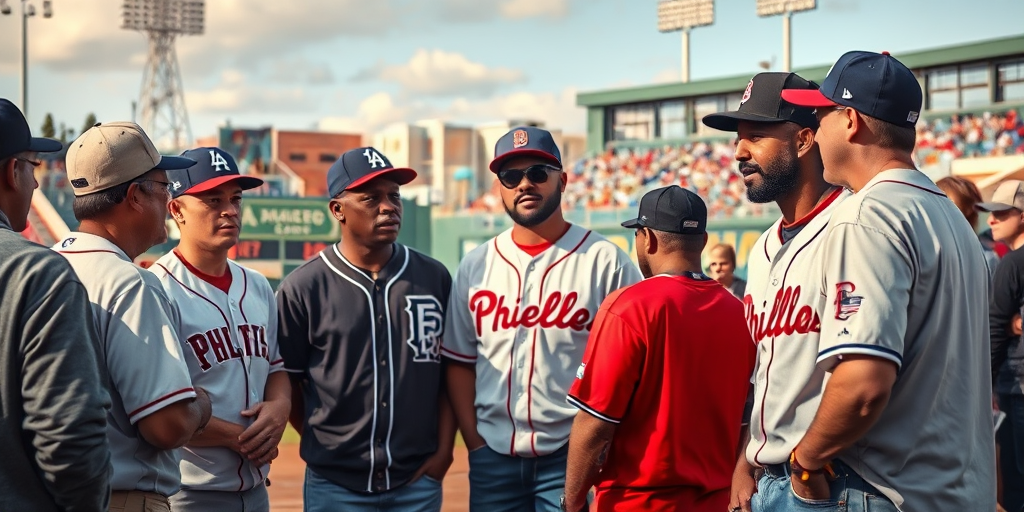Do the Philadelphia Phillies Have a Diversity Problem?
An inquiry into the Philadelphia Phillies’ diversity issues sheds light on a pressing concern recently highlighted by People’s World’s Dom Shannon. As Major League Baseball (MLB) grows increasingly diverse, the Phillies remain conspicuously behind, being the only team without a Black player on their Opening Day roster since 2022. This comes at a time when the league as a whole boasts a 40% diversity rate on its rosters, raising questions about the Phillies’ approach and its implications for performance and community representation.
A Costly Lineup Without Postseason Success
The 2025 season ended in disappointment for the Phillies. Despite having a star-studded lineup with contracts totaling $709 million, featuring talents like Bryce Harper, Trea Turner, and Kyle Schwarber, they exited the playoffs early after a loss to the Los Angeles Dodgers in the National League Divisional Series. Critiques from commentators, notably Hunter Brody, center on the team’s offensive execution, drawing attention to the repeated pattern of regular-season success failing to translate into playoff advancement.
Brody points out, “They’re getting to the NLDS and folding because their brand offensively…doesn’t work,” indicating a strategic misfire despite expensive talent. This failure led to a reflection on the Phillies’ roster and the stark lack of diversity contributing to the ongoing struggles.
Rethinking Diversity: Lessons from the League
The case for diversifying the Phillies is not just about optics or meeting quotas. Dom Shannon argues for diversity as a strategic advantage, drawing parallels with the MLB’s broader trajectory towards inclusive recruitment. In contrast to the Phillies’ lineup, 49% of 2023’s top 100 prospects were players of non-white backgrounds, suggesting that the future of talent is gravitating towards diversity.
The precedent set by diverse teams like the 2024 World Series champions, the Los Angeles Dodgers, illustrates the potential benefits. Their embrace of global talent, including players from Japan and other non-majority white countries, symbolizes the competitive edge found in diverse rosters.
The 2008 Nostalgia: A Diverse Winning Formula
The last world championship for Philadelphia came in 2008, driven by a notably diverse team featuring Black stars like Jimmy Rollins and Ryan Howard. The composition back then mirrored the city’s demographic fabric more closely, encompassing a richer, multicultural representation. Comparatively, today’s predominantly white roster falls short of such diversity, which Shannon suggests might hinder their championship prospects.
Former player J.P. Crawford’s success with the Seattle Mariners, another diverse contender, exemplifies how tapping into a wider talent pool can lead to team achievements and individual growth.
Community Impact and Ongoing Conversations
The issue of diversity extends beyond the field, resonating with the values and aspirations of Philadelphia’s residents. The city, known for its cultural richness and diversity, watches closely as their beloved team navigates these challenges. For some, the Phillies’ current trajectory feels removed from the inclusive spirit of their city, raising concerns about representation and community engagement.
Local sports fanatic and community leader James Harrington observes, “Philadelphia has always been a melting pot, a place where diversity thrives. It’s important that our sports teams, especially our Phillies, reflect that.”
Potential Future Steps and Institutional Change
For the Phillies, addressing this diversity gap could entail more proactive scouting in non-traditional and international markets, similar to strategies embraced by other MLB franchises. Furthermore, fostering environments where diverse cultures are seen as beneficial and necessary must become part of the team’s values.
As Philadelphia navigates this pivotal moment, the implications extend to fostering better team unity, community pride, and, ultimately, success in achieving sporting excellence. How these steps are implemented remains to be seen, but they represent potential paths forward that honor both the legacy and future promise of the Phillies.
Engagement and Support for Diversity Initiatives
For residents wishing to express their views or learn more, the organization could foster public discussions and solicit input through community forums. Information on team initiatives and updates can also be disseminated through local channels and online platforms, engaging fans in meaningful ways.
As the 2025 season closes, the conversation around diversity for the Phillies continues to evolve, challenging the team to revisit its strategies and commitments. Addressing these issues thoughtfully could turn a spotlight into a beacon for positive change, reflecting what Philadelphia represents—a diverse, resilient community ready to embrace the future.







